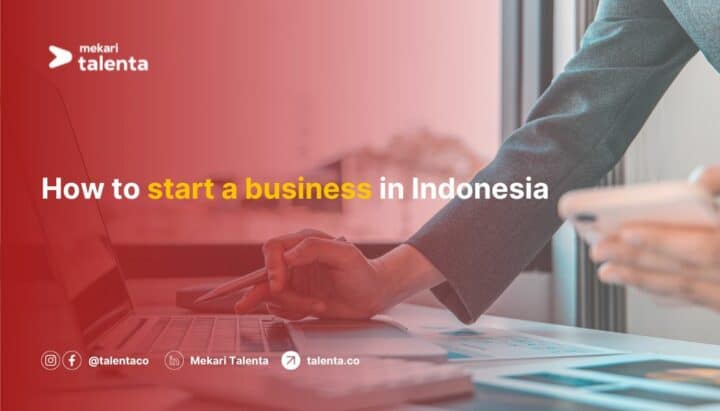How to start a business in Indonesia? Starting a business in Indonesia can be appealing due to its large and growing economy, a vast consumer base, rich natural resources, strategic location for trade, investment incentives, diverse industries, and potential in tourism.
These aspects will offer significant business opportunities. However, it’s essential to navigate the regulatory environment and cultural differences carefully.
In this article, Mekari Talenta would like to discuss what should be considered before building a business in Indonesia as a foreigner.
Can foreigners set up a business in Indonesia?
There are so many opportunities for foreigners who want to establish businesses in Indonesia. But there are some things that need to be considered.
First of all, you need to do your research first whether or not the planned business activity is well suited in Indonesia.
You also need to understand who your potential customers are. Who they are and what kind of business that can cater their needs? Don’t forget to take local religion, customs, and beliefs into consideration as well..
After that, you also have to follow a proper procedure. This applies in other countries as well, not only in Indonesia. To make things easier, you can also get help from a business consultant to discuss what needs to be prepared.
By doing this, you also can get an overview of regulations and restrictions in Indonesia.
Types of business entities in Indonesia
Types of business entities is important on how to start a business in Indonesia. And there are three common types of business entities.
- PT PMA (Perseroan Terbatas Penanaman Modal Asing), a foreign-owned limited liability company.
- Limited Liability Company (LLC) or PT (Perseroan Terbatas), a locally-owned limited liability company.
- Branch or Representative Office (RO) for foreigners starting a business in Indonesia branch, depending on the nature of the business.
Let’s discuss each one of them.
PT PMA
In PT PMA, the capital is sustained by foreign citizens. In the form of direct investments and other schemes, foreign business entities or even governments can provide this investment.
PT PMA also needs to have at least two members, be it a director and a commissioner, each being either an individual or a legal entity. A minimum shareholding requirement ensures that the company will never be without its key decision-makers and also prevents situations where one shareholder might unfairly take advantage of another shareholder’s equity stake.
This entity must also prioritize local workers who will not only produce a quality product but also allow for sustainable progress for the organization.
If bringing in more people from overseas is needed, PT PMA have to train and transfer the knowledge to local workers.
Foreign investors can set up their companies anywhere. But according to Indonesian Government, industrial business sector must be located in industrial estates.
PT PMA advantages
- PT PMA has as many rights as any local company in Indonesia since they are also subject to the same regulations and laws.
- Foreign investors own 100% or less of the company.
- Easier to obtain licenses and permits.
- Lower on-site tax or import duties.
- Qualifies for special customs facilities.
- Eligible to sponsor foreign employees.
- Temporary stay permit for foreign investors for 2 years.
- Foreign investors are eligible to have a permanent stay permit if they have lived in Indonesia for 2 years consecutively.
- Granted a re-entry multiple trips for permanent stay permit holders with 24 months maximum duration since the permanent stay.
LLC or PT advantages
- Required minimum capital can vary. It is based on the company’s business classification.
- Allowed to have three main business activities.
- Limited Liability Company is bound and protected by company activities.
- Leadership can be replaced easily by General Meeting of Shareholders (GMS).
- Clear responsibility structure to owners or shareholders.
- A shareholder’s liability is limited to how much his share is in the company.
- Extra funding can be achieved by putting in more shares.
- Foreigners are eligible to get Kartu Izin Tinggal Terbatas (KITAS) or Temporary Stay Permit.
- No strict limitations.
- Allowed to participate in open government tenders.
Representative Office (RO)
Before the establishment of PT/PMA, a representative office, in the form of a branch office of the parent company, is often established.
It is necessary for the company to prove that its products and services are marketable in Indonesia, so an examination will be performed after the company receives approval from Indonesian authorities.
Once this has been done, the company can establish either type of the entities mentioned.
The tax policies in Indonesia make opening up a representative office easy. This happened because RO doesn’t have a large amount of taxes on initial incorporation or transferring ownership shares over time.
These businesses, however, are subject to some limited regulations which may affect companies seeking more than one location, such as limitations on dividends paid abroad, restrictions on conducting banking, sales, and purchases within this type of establishment, and limitations on foreign equity participation (which may require special approval).
Representative Office advantages
- No minimum paid-in capital required
- No shareholders requirements necessary
- No directors and commissioners required
Key Considerations when choosing a business structure
Choosing the right business structure is a critical decision on how to start a business in Indonesia. Here are key considerations to keep in mind when selecting a business structure.
Liability protection
Consider the level of personal liability protection you need. Sole proprietorships and partnerships offer little to no protection, whereas corporations and limited liability companies (LLCs) can shield personal assets from business liabilities.
Tax implications
Different business structures have different tax implications. Understand how each structure is taxed and which one aligns with your financial goals.
For example, sole proprietorships and partnerships are typically taxed as pass-through entities, while corporations face double taxation.
Ownership and management
Consider how you want to structure ownership and management. Sole proprietorships and partnerships are typically easier to set up and manage, while corporations and LLCs offer more flexibility in terms of ownership and management structure.
Start-up costs and complexity
Some business structures, like sole proprietorships and partnerships, are relatively easy and inexpensive to set up. Corporations and LLCs often involve more paperwork and higher initial costs.
Raising capital
If you plan to raise capital from investors, corporations are often the preferred choice because they can issue different classes of stock. LLCs and partnerships may have limitations in this regard.
Regulatory requirements
Different structures come with varying degrees of regulatory requirements. Corporations, for example, must comply with more extensive reporting and governance requirements than sole proprietorships.
Transferability
Consider whether you want the flexibility to transfer ownership interests easily. Some structures, like corporations, allow for the sale or transfer of stock, while others, like partnerships, may require more complex processes.
Exit strategy
Think about your long-term plans for the business. If you anticipate selling the business or going public, a corporate structure may be more suitable.
Professional advice
Consult with legal and financial professionals who specialize in business structures. They can provide tailored advice based on your specific circumstances and goals.
State and local considerations
Be aware that business structure options and regulations can vary by state and locality. Ensure compliance with local laws and regulations.
Flexibility
Consider whether you want the flexibility to change your business structure in the future. Some structures allow for easier conversion or restructuring than others.
It’s essential to carefully weigh these factors and choose the business structure that best aligns with your business model, long-term objectives, and risk tolerance.
Additionally, you may want to revisit your choice as your business grows and evolves.
Consulting with legal and financial professionals is often a wise step to ensure you make an informed decision.
How much does it cost to set up a company?
Every foreigner must have the knowledge regarding the minimum share capital required and how does it work to start a business in Indonesia.
Minimum share capital is the amount of cash invested by the company’s founders in exchange to own the shares of the company.
The amount of share capital can vary depending on the type of business. For example:
Foreign owned business (PT PMA): USD 300,000
Public Limited Company (Perusahaan Milik Publik): Rp3 billion
Limited Liability Company (PT): Rp50 million
Minimum number of shareholders
The minimum number of shareholders also varies based on the type of company. For example, a foreign-owned company or PMA requires one director and one shareholder.
Company’s location
One essential thing to do first before incorporating your company in Indonesia is choosing a place for your company.
This is because Indonesia has a localized administration process. Let’s say you want to establish it in Jakarta, your company address must be a building with a legitimate building permit (IMB).
The building permit has also become a permission for the building to be an office. But now, many businesses create virtual offices so they can cut down costs.
Minimum number of directors
Foreign-owned business or PMA requires the company to register at least one director. Other types of business require a minimum number of two directors.
Requirements for starting a business in Indonesia
Choosing a preferred company structure is the first step to start a business in Indonesia. Some of the options are:
- Foreign Limited Liability Company (PT PMA)
- Local Limited Liability Companies (PT)
- Representative Offices
As for foreigners, PMA is the preferred option when starting a business. It is because they can have 100% ownership and also are allowed to employ foreign workers.
You must meet the following requirements for setting up PMA:
- Have one director and one commissioner. Either one must be a local Indonesian. You will also need to have two shareholders.
- You must prepare around Rp10 billion in capital investment. Share capital must be at least 25 percent of the total required capital.
- A local office address to obtain your domicile letter. It must be an office, not residential address.
Registration has to be done online via OSS system. Then, you can get NIB and any other licenses you may need for the company’s establishment. These are some of the steps.
- Obtain approval for the name of your company
- Acquire your Deed of Incorporation (including Articles of Association). A notary needs to be present.
- Obtain approval of your legal entity. Approval will be granted by the Ministry of Law and Human Rights.
- Register for your Tax ID (NPWP). This is required to secure your business licenses, meet your tax obligations and to conduct banking activities.
- Obtain a domicile letter which identifies your business location.
- Obtain your unique company profile number (NIB), business license and any local permits required.
- Apply for any other necessary licenses you may need.
- Obtain your work permits
- Open your bank account
Benefits of starting a business in Indonesia
Before you know the requirements on how to start a business in Indonesia you must also know some of the benefits of building a business here.
Setting up a business in Indonesia offers several advantages, making it an attractive destination for entrepreneurs and investors. Here are some of the key advantages:
Growing economy
Indonesia is one of the world’s largest emerging economies, with a consistent annual growth rate. The country offers a vast market for various products and services, presenting significant business opportunities.
Large consumer base
With a population of over 270 million people, Indonesia provides a substantial consumer market. The country’s expanding middle class contributes to increased consumer spending and demand for goods and services.
Natural resources
Indonesia is rich in natural resources, including minerals, oil, natural gas, and agricultural products. Businesses related to these sectors can find significant opportunities for growth and investment.
Strategic location
Indonesia’s strategic location in Southeast Asia makes it a regional hub for trade and commerce. It provides access to neighboring markets like Singapore, Malaysia, and Australia, making it an attractive destination for businesses with regional ambitions.
Investment incentives
The Indonesian government offers various incentives to attract foreign investment. These incentives may include tax breaks, reduced import duties, and investment guarantees to encourage foreign businesses to invest in the country.
Special economic zones (SEZs)
Indonesia has established Special Economic Zones (SEZs) in areas like Batam, Bintan, and other locations. These zones offer preferential conditions for businesses, including simplified regulations, tax incentives, and infrastructure support.
Infrastructure development
The government has been investing heavily in infrastructure development, including roads, ports, airports, and telecommunications. This enhances connectivity within the country and improves the overall business environment.
Diverse industries
Indonesia boasts a diverse economy with opportunities in various sectors, including manufacturing, agriculture, technology, tourism, and more. This diversity allows entrepreneurs to explore multiple business avenues.
Tourism potential
Indonesia is renowned for its beautiful beaches, cultural heritage, and natural attractions. This makes it an ideal location for businesses in the tourism and hospitality industry.
Trade agreements
Indonesia has entered into several trade agreements and partnerships with other countries and regions, facilitating international trade and investment.
Conclusion
While Indonesia offers numerous advantages for businesses, it’s essential to note that challenges and considerations also exist, such as navigating complex regulations, addressing language barriers, and understanding cultural differences.
Entrepreneurs and investors should conduct thorough market research, seek local advice, and carefully navigate the regulatory landscape to succeed in the Indonesian market.
Human resource can also be an issue since HR compliance in Indonesia is closely related to the laws and regulations.
Therefore when trying to implement HR strategies and its software for a more efficient HR practice, you must selectively choose a software that is always up to date to Indonesia’s law.
One of them is Mekari Talenta. Mekari Talenta is an HR software that can make your HR process more efficient.
From attendance, payroll system that has complied with regulations, employee self-service, performance management system, and even time management, you can rely on Mekari Talenta for an easier HR process.
If you like to try Mekari Talenta’s software demo for free, you can sign up here and have a discussion with our team regarding your HR needs.









